Practicing Zen Through Japanese Tea Ceremony
When folks think about practicing Zen, they might picture meditation cushions or quiet retreats, but the Japanese tea ceremony offers a refreshing twist. It’s all about mindfulness, simplicity, and connection, engaging participants in each step—from the calming purification to whisking the matcha. With a skilled tea master guiding the way, everyone can find a moment of tranquility in the hustle of daily life. But what makes this tradition so special, and how can anyone easily incorporate it into their own routine?
Key Points
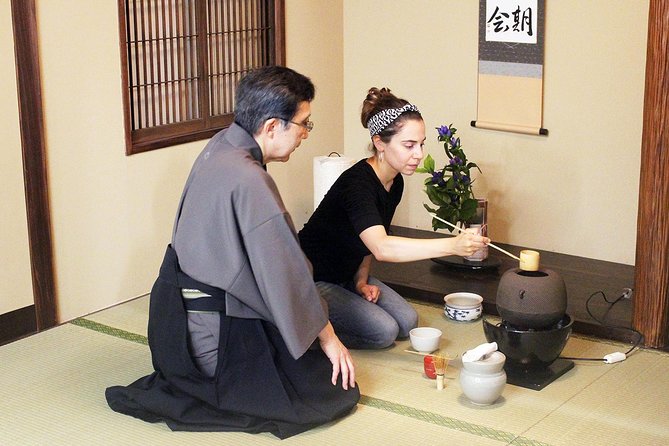
- The Japanese tea ceremony embodies Zen principles, promoting calmness and mindfulness through each deliberate step and moment of reflection.
- Engaging in rituals, such as purification and matcha preparation, enhances present awareness and fosters a meditative state.
- Sharing traditional sweets during the ceremony encourages community connection and shared experiences, reinforcing the harmony central to Zen.
- The guidance of a skilled tea master enriches participants’ understanding of cultural significance, making the experience accessible and engaging for all.
- Participation in the ceremony, with its emphasis on simplicity, offers an affordable way to explore Zen and Japanese culture while enjoying matcha.
It's also worth checking out some other tours and experiences nearby.
The Essence of Zen
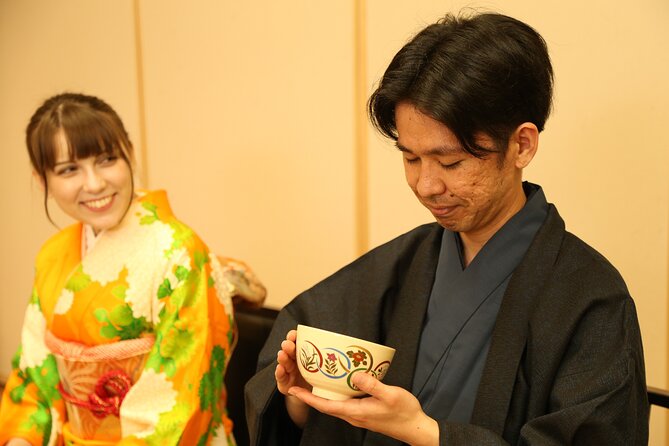
Zen embodies a state of calm and mindfulness, making it the perfect foundation for the tranquility found in the Japanese tea ceremony. This practice isn’t just about sipping tea; it’s a moment to pause and reflect.
The simplicity of the ceremony encourages participants to focus on the present, fostering a sense of peace. By engaging in each step—from preparing the matcha to savoring the sweets—you can cultivate mindfulness and appreciation for small details.
Plus, it offers a budget-friendly way to take in Japanese culture without breaking the bank. Whether you’re a newbie or a tea enthusiast, experiencing this serene ritual can be a refreshing escape from everyday chaos.
History of Japanese Tea Ceremony
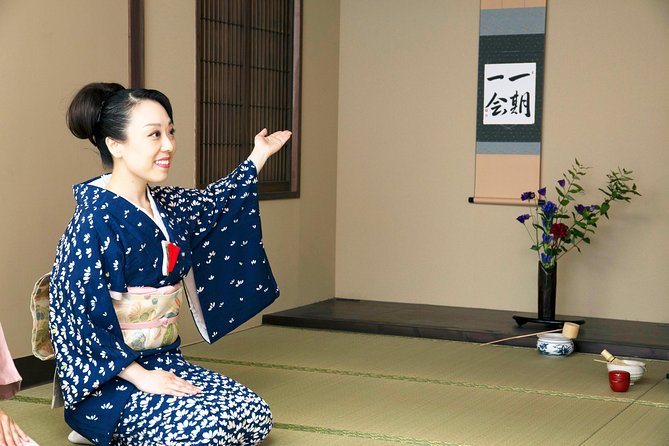
The Japanese tea ceremony has a rich history that intertwines with the cultural and spiritual practices of Japan, evolving from simple tea drinking into a profound ritual of mindfulness and appreciation.
It dates back to the 9th century when Buddhist monks brought tea from China. By the 12th century, tea gained popularity among samurai and aristocrats, leading to the development of tea houses.
The ceremony, known as ‘chanoyu,’ became a way to express harmony and respect. In the 15th and 16th centuries, tea masters like Sen no Rikyū refined its practices, emphasizing simplicity and spiritual depth.
Today, this age-old tradition invites everyone to pause, reflect, and connect with the moment, making it a budget-friendly way to experience Japanese culture.
Rituals and Practices
During the Japanese tea ceremony, participants engage in a series of mindful rituals that highlight harmony, respect, and tranquility. These practices create a serene atmosphere where everyone can appreciate the moment.
Here are three key elements that stand out:
-
Purification Ritual: Participants wash their hands and cleanse the utensils, symbolizing the removal of impurities and distractions.
-
Matcha Preparation: The careful whisking of matcha green tea becomes a meditative act, connecting the participant to the present.
-
Sharing Sweets: Traditional Japanese confections are offered, promoting a sense of community and shared experience.
This budget-friendly experience allows anyone to embrace Zen principles without breaking the bank.
Plus, with bilingual instruction, everyone can dive into the rich cultural significance behind each ritual.
Role of the Tea Master

A skilled tea master guides participants through the intricate rituals of the Japanese tea ceremony, ensuring everyone feels connected and engaged in the experience.
They’re not just pouring tea; they’re sharing a slice of Japanese culture. With a warm smile and a knack for storytelling, the tea master explains the significance of each step, from the preparation of the matcha to the graceful movements that embody respect and harmony.
Participants learn hands-on, making their own tea while soaking in the Zen practices tied to the ceremony. This approachable style makes the experience accessible, whether you’re a tea novice or a seasoned enthusiast.
Plus, with bilingual instruction, everyone can enjoy the beauty and depth of this timeless tradition.
Benefits of Participating
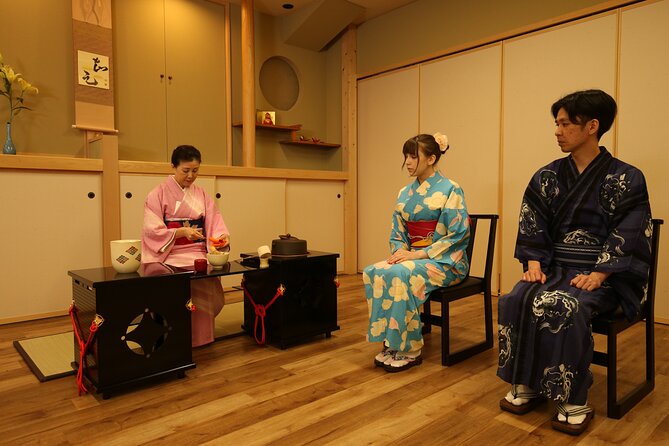
Participating in a Japanese tea ceremony offers a unique blend of culture and personal tranquility, making it a rewarding experience for anyone looking to deepen their understanding of Zen practices. Attendees discover several key benefits:
-
Mindfulness Mastery: Engaging in the meticulous steps of the ceremony fosters a sense of mindfulness, helping participants focus on the present moment.
-
Cultural Insights: Guests learn about Japanese traditions and the art of tea-making, enriching their appreciation of this beautiful culture.
-
Community Connection: Sharing this experience with others creates bonds, enhancing feelings of harmony and respect.
With affordable prices and convenient accessibility, joining a tea ceremony is a practical way to explore Zen and connect with a vibrant culture—all while sipping on delicious matcha!
Cultural Significance of Matcha
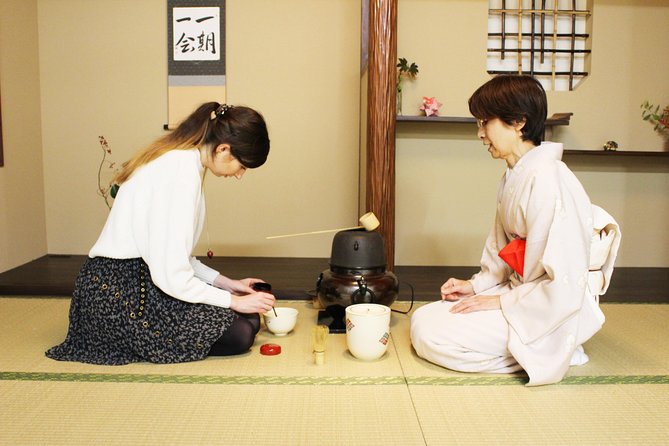
Matcha holds a special place in Japanese culture, symbolizing harmony and mindfulness while offering a delicious way to connect with centuries of tradition.
This vibrant green tea isn’t just a drink; it’s a ritual that embodies respect and tranquility. People often gather around matcha to share moments of peace and reflection, making it a social glue that binds communities.
Plus, it’s packed with antioxidants, making it a healthy choice too! Whether enjoyed at a tea ceremony or sipped casually, matcha invites everyone to slow down and appreciate the present.
The cultural significance of matcha goes beyond flavor; it’s a reminder of the beauty in simplicity and the joy of shared experiences.
Preparing for Your Ceremony
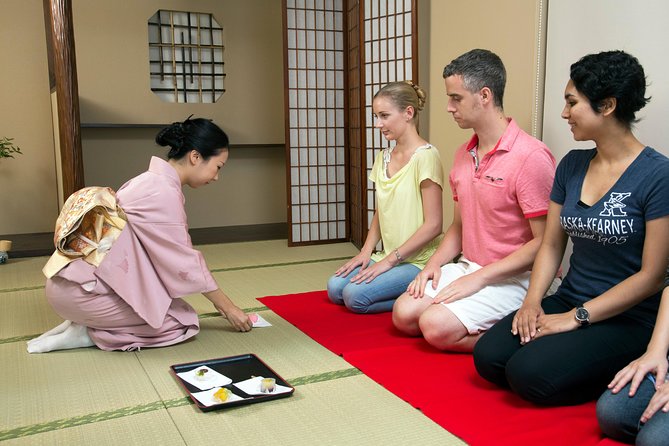
Getting ready for the tea ceremony is all about embracing the moment and understanding what to expect, so participants should come prepared to enjoy a unique blend of culture and tranquility.
To make the most of the experience, consider these three essential items:
-
Comfortable Clothing: Dress in something relaxed that allows you to sit comfortably on the floor.
-
An Open Mind: Approach the ceremony with curiosity and a willingness to learn about the art of tea.
-
A Small Gift: If you want, bring a little treat to share, fostering connection and goodwill among participants.
With these simple preparations, everyone can fully enjoy the calming and enriching world of the Japanese tea ceremony.
Enjoy the moment!
Embracing Harmony and Tranquility
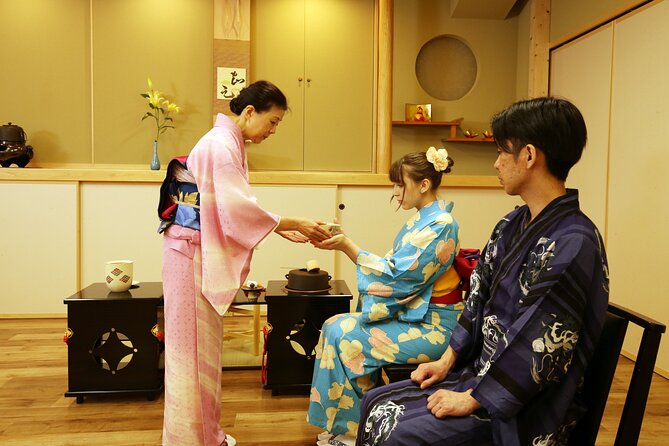
In the serene atmosphere of the tea ceremony, everyone can truly experience a sense of harmony and tranquility that transcends everyday life. Participants enjoy the ritual, learning to appreciate each moment, from the delicate preparation of matcha to the graceful presentation of sweets.
It’s not just about drinking tea; it’s about connecting with oneself and others. The experienced tea master guides everyone, making the process accessible and enjoyable. Plus, the affordable prices make it easy for anyone to join in and relish this cultural experience.
Here's a few more nearby tours and experiences we think you'll like.
- 3 Hours Photography and Food Tour in Setagaya
- 1 Day Bus Tour To Mitsumine Shrine From Shinjuku
- Bunraku Performance In Kita-Senju Tokyo
- Tokyo Tour With Guided Interpreter Tokyo/Yokohama ⇒ Tokyo 8 Hours up to 18 People Private Bus Use
- Tokyo Narita Airport (NRT) to Hakone – Private Arrival Transfer
- 4-Days Private MT Fuji Tokyo Kamakura Nikko Hakone Yokohama Tour
Questions You May Have
What Should I Wear for the Tea Ceremony?
For the tea ceremony, she should wear comfortable, casual clothes. Loose-fitting attire is perfect, and if she has a kimono, that’d enhance the experience. Avoiding flashy accessories keeps the focus on the ceremony itself.
Is the Ceremony Suitable for Children?
The ceremony’s perfect for kids! They’ll enjoy the hands-on experience, learn about tea-making, and appreciate the culture. Plus, it’s accessible and engaging, making it a fun outing for families without breaking the bank.
Can I Take Photos During the Ceremony?
During the ceremony, participants can take photos, but it’s best to ask the tea master first. They appreciate respectful behavior, so capturing moments while being mindful of the experience works well for everyone involved.
Are Dietary Restrictions Accommodated During the Experience?
Dietary restrictions aren’t specifically mentioned, but the tea master’s flexible approach could accommodate some needs. It’s best to reach out ahead of time to see what options they can offer for participants.
How Long Does the Tea Ceremony Last?
The tea ceremony lasts about 90 minutes, giving participants ample time to enjoy the experience. It’s a perfect balance of learning, practicing, and savoring authentic matcha and traditional sweets without breaking the bank.
Not for you? Here's more of our most recent tour reviews happening neaby
- Shibuya Anime and Manga Tour With Ramen Lunch
- Shibuya Hidden Street Eats: Japanese BBQ, Fried Chicken, & More!
- Kitchenware Shopping and Cooking Experience in Kappabashi
- Private Shopping Tour From Tokyo to Mitsui Outlet Park Makuhari
- Samurai Experience (with Costume Wearing)
- Tokyo: Samurai Experience and Show
- Tsukiji Old and New – Fish Market Food & Hamarikyu or Skyview
- Private Shopping Tour From Tokyo City to Lake Town Outlet
- A Typical Evening in Shinjuku
- Tokyo Kimono Experience @Japanese-Style Studio Near by Happo-En
- Izakaya Private Hopping Tour in Kamata
- Explore Nikko Toshogu Shrine and Edo Wonderland
- Private Trekking Experience up to 7th Station in Mt. Fuji
- Private Transfer: Tokyo to Haneda Airport HND in Luxury Car
- Morning Discount! Shuttle Van Transfer, Tokyo⇒Haneda, Narita, TDL
Break Down
Practicing Zen through the Japanese tea ceremony is a fantastic way to slow down and embrace the moment.
It’s not just about sipping matcha; it’s about connecting with yourself and others in a peaceful setting.
With a bit of guidance from a tea master, anyone can enjoy this beautiful tradition without breaking the bank.
So why not gather some friends, brew up some tea, and experience the harmony and tranquility that the ceremony offers?
It’s simple, rewarding, and truly memorable!
